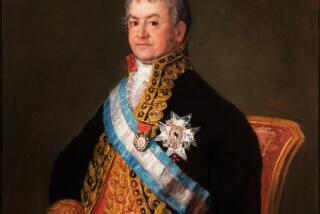Laura Skandera Trombley is named new president of Huntington Library
- Share via
Laura Skandera Trombley isn’t afraid of starting a good public tussle. Her books on how women helped shape the life of Mark Twain, America’s greatest literary celebrity, have sparked controversy among scholars.
The Pitzer College president, named Tuesday as the next president of the Huntington Library, Art Collections and Botanical Gardens, says that she sees her new job as an excellent platform for selling the public on the idea that the humanities, which are at the core of what the Huntington does, are worth getting riled up about.
“The humanities increasingly are treated as marginal to whatever the center is,” said Trombley, 54, citing cuts in federal funding for research and the widespread post-recession assumption that a college education’s primary purpose is to land a lucrative job. “I want to try to be a public voice for the importance of the humanities and how we all actually love them — we just need to be reminded.”
Trombley succeeds Steven Koblik, who is retiring after nearly 14 years as president, in July. She will be the first woman to lead the Huntington, with its staff of 450, since it opened in 1927.
The Huntington gets more than 600,000 visitors a year — some coming to stroll the gardens, some to peruse a collection of mainly British and American art from the 1700s and 1800s, and some to see rare books, maps and manuscripts on display in the library.
But for Trombley, as for Koblik, the Huntington’s role as a repository for historical, literary and scientific writings that scholars can draw on for their research is as important as the more public attractions. The collection includes “Blue Boy’ and “Pinkie,” famous paintings of upper-crust 18th century British youth by Thomas Gainsborough and Thomas Lawrence, respectively, a Gutenberg Bible and a copy of the first published edition of Shakespeare’s collected plays.
Unlike most museums, Koblik said Tuesday, “maximizing attendance is not our goal.” The Huntington’s endowment has grown tremendously under Koblik, to about $450 million, and its earnings generate about $20 million annually toward budgets that are typically about $50 million.
Koblik said that over the last quarter-century — about half under him and half under Robert Skotheim — adding to the endowment, the campus and the collections has “provided a foundation so the institution can imagine its future and have the ambition to move forward” under Trombley, the third consecutive president who arrives in San Marino after a long tenure as president of a small liberal arts college.
“I don’t think we are an institution that has fulfilled its potential in any of our areas,” Koblik said, leaving plenty of room for new accomplishment for the next leader.
Asked what her “elevator pitch” would be to promote the Huntington, which occupies a 207-acre estate in San Marino, Trombley chuckled and gave it a shot.
“My elevator pitch for the Huntington is that we all, everyone I have met in my life, loves the humanities,” she said. “They’re just not [always] aware of it. My job is to make people understand that every time they appreciate a photograph or picture or question the meaning of their life or have goose bumps because of a favorite play or song or movie, that’s the humanities. Life and the humanities are inextricable. That’s what I want to talk about, along with the pleasure that comes with having an active intellectual life.”
Smitten by gardens
As a girl growing up in Torrance, Trombley recalls having been smitten mainly by the gardens in her visits to the Huntington. As a PhD candidate in English at USC, however, it was the library’s archives on Twain that proved vital to researching her dissertation, which eventually evolved into her 1994 book, “Mark Twain in the Company of Women.”
“Mark Twain’s Other Woman: The Hidden Story of His Final Years” was published in 2010 after 16 years of research and writing in which she squeezed out time to work on the book while a vice president and dean at Coe College in Cedar Rapids, Iowa, and, starting in 2002, as president of Pitzer.
The book, also partly researched at the Huntington, grappled with the complicated soap opera that Twain’s last years turned into, after his relations with his once-prized secretary, Isabel Lyon, turned acrimonious.
Trombley said that even the academic jousting over her books has been “enormously fun” and that she’s girded herself for any challenges by making sure to have “not just one footnote, but two footnotes to show where I found the evidence and why.”
“Her latest book got a lot of flak,” said Robert Hirst, general editor of the Mark Twain Project at UC Berkeley, which compiles authoritative editions of everything Twain ever wrote. “Her book was firmly on the side of Isabel Lyon. It takes her side and argues for her in a way that prevents the kind of weighing evidence a scholar is obliged to do.”
A reviewer for the Minneapolis Star Tribune, however, found “Mark Twain’s Other Woman” enthralling: “The story is incredible and it has been remarkably well hidden. ... Trombley, an impeccable researcher … edits reams of letters and documents into a complex, absorbing narrative, which, like a good mystery, gets more suspenseful as it goes.”
There’s not much controversy over whether Trombley has been good for Pitzer, where she’ll step down in June.
She oversaw the construction of new facilities — Trombley said they included the 1,000-student campus’ first art galleries, for which she hired the first curator — and her fundraising skills helped Pitzer raise $110 million in her 12 years, which helped dramatically increase its endowment.
Pitzer also prospered under Trombley in academia’s biggest beauty contest, U.S. News & World Report’s annual rankings of colleges and universities. It currently ranks 35th nationally among 178 rated liberal arts colleges, up from No. 70 in 2002-03, her first year as president.
“She leaves an institution sound in its finances and soaring in its accomplishments,” Pitzer’s board chair, Shahan Soghikian, said in a news release about Trombley’s impending exit. Thomas Poon, a chemistry professor and former associate dean of faculty, will be her interim successor.
Dana Gioia, a former chairman of the National Endowment for the Arts who’s now a professor at USC, applauded the Huntington for picking another president who’s not just an administrator but an accomplished scholar.
‘A myth’
“There’s a myth of the professional manager that’s very damaging to the arts,” he said. “The people running cultural institutions need to understand those disciplines from the inside.”
Besides important holdings in 18th and 19th century British and American art, Gioia said, the Huntington “is the greatest literary archive in the western half of the United States. It’s particularly important to scholars and writers.”
The Huntington’s board chair, Stewart Smith, said that Trombley’s name was on its candidates list almost from the moment in February when Koblik announced he’d be retiring.
“Right off the bat … she came to mind,” Smith said. “She was in the pool before she knew she was in the pool.”
Four-year contract
He said Trombley will begin with a four-year contract. Her annual compensation at Pitzer averaged $767,000 from 2010-2012, the most recent years reported in its public filings — eclipsing Koblik’s pay at the Huntington, which totaled $446,000 in salary and benefits in 2012.
Smith wouldn’t comment on what Trombley will earn but said Koblik has been underpaid compared with top executives at other prominent L.A. cultural institutions.
Trombley “is the person we wanted for the job, so we negotiated what seemed fair and reasonable to both parties.”
Her recent writings include a personal meditation on her life in the Chronicle of Higher Education.
Trombley wrote with humor, poignancy and thoughtfulness about being a child who had been conditioned to make up stories to hide the fact she’d been adopted. (Her father, no longer living, taught second grade in the Los Angeles Unified School District; her mother, who’s 89, was an elementary school principal in Inglewood.)
In the essay, which noted how her personal search for an identity helped feed her interest in delving into mysteries surrounding Twain, Trombley spoke publicly for the first time about being adopted and about the effect of her divorce 41/2 years ago from artist Edmond Trombley. Their son, who goes by his nickname, Sparkey, will be a freshman next year at Union College in Schenectady, N.Y.
“One of the great things about turning 50, and other things in my life, is that I think I live in the absence of fear,” Trombley said of her decision to get so personal in print.
Professionally, stories surrounding Twain continue to enthrall her — she’s begun research for another book about him but is keeping the subject secret for now. “My suspicion is it will get people’s attention,” she said.
Might the Huntington be expected to muster an exhibition on Twain now that she’s on board? Trombley chuckled then answered: “If I were a betting person I would say [the odds] were really quite good.”
More to Read
The biggest entertainment stories
Get our big stories about Hollywood, film, television, music, arts, culture and more right in your inbox as soon as they publish.
You may occasionally receive promotional content from the Los Angeles Times.











